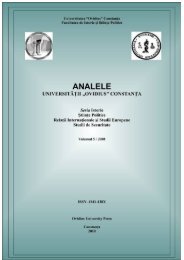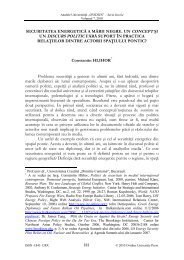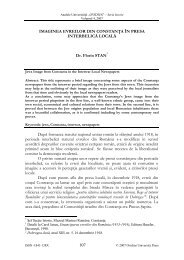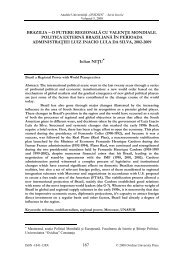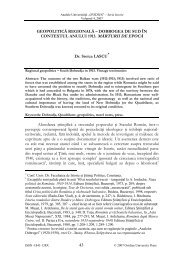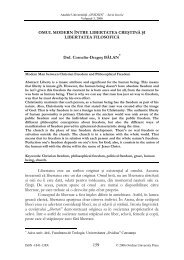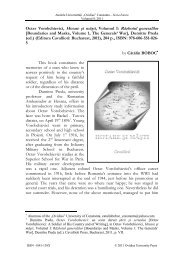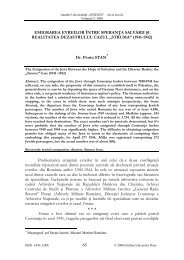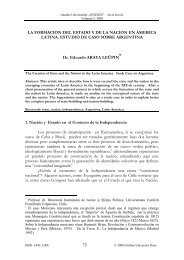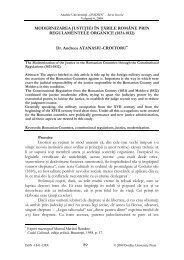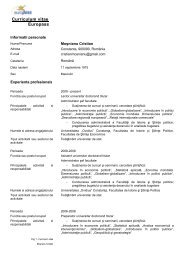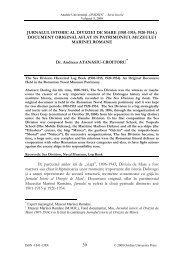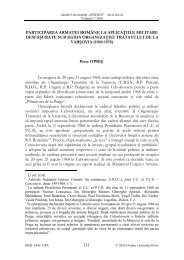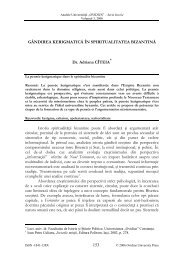analele universitÄÅ£ii âovidiusâ constanÅ£a - AUOCSI
analele universitÄÅ£ii âovidiusâ constanÅ£a - AUOCSI
analele universitÄÅ£ii âovidiusâ constanÅ£a - AUOCSI
Create successful ePaper yourself
Turn your PDF publications into a flip-book with our unique Google optimized e-Paper software.
Alexey A. Gromyko / Analele Universităţii „OVIDIUS” / Vol. 6/ 2009<br />
civilization-based comparative studies are significant means of analysis global<br />
processes, trends and forecasts.<br />
It is a good sign that weighted and unbiased attention to civilizational<br />
theme has been shown recently by the Russian leadership on foreign policy.<br />
“Today, nobody can cope with global challenges single-handedly… What is<br />
needed is collective leadership of major powers that should represent the<br />
geographical and civilizational dimensions… Spiritual values of all world<br />
religions make it imperative to achieve multicivilizational accord and fight<br />
manifestations of xenophobia and racism… These are the tasks to be tacked<br />
within the framework of the Alliance of Civilizations,” – writes Russian foreign<br />
minister Sergei Lavrov. 4<br />
The renaissance of civilizational studies over the past decades has been<br />
followed by the emergence and the increase of numbers of research centers in<br />
many countries. In Russia, there are the Center for Civilizational and Regional<br />
Studies at the Russian Academy of Sciences, Pitirim Sorokin/Nikolai<br />
Kondratieff International Institute, Inter-Civilizational Council at the Institute<br />
of Europe of the Russian Academy of Sciences to name but a few. Among<br />
international bodies, one of the many is the Dialogue of Civilizations World<br />
Public Forum. In 2008, the international organization Alliance of Civilizations<br />
held the first Forum in Madrid. The Alliance was initiated in 2005 by the former<br />
United Nations general secretary Kofi Annan with the support of Spain and<br />
Turkey.<br />
Those were the works of Samuel Huntington and Francis Fukuyama,<br />
with opposite views on the prospects of mankind, that gave rise to the<br />
popularity of civilizational discussions, at least in North America and Western<br />
Europe. Since their publication in the 1990s, the discourse has much broadened.<br />
In the past the same interest to the subject was shown in the first thirty years of<br />
the 20 th century and associated with the names of Nikolay Danilevsky, Oswald<br />
Spengler and Arnold Toynbee. After the war, the interest was associated with<br />
Fernand Braudel and the Annales School.<br />
The term “civilization” was coined by French Enlightenment philosophers who<br />
set off progressive forms of the developments of mankind against barbarism.<br />
This understanding of human history (common history of human civilization),<br />
as getting rid of wildness and barbarism, was articulated by Louis Morgan. The<br />
same understanding settled among ordinary people and in everyday life. Today,<br />
to be a “civilized person” means to be “polite, well-bred, refined”, as “to join<br />
civilized countries” means to become an “advanced society”.<br />
Later, the Enlightenment developed several interlinked approaches:<br />
economic-social – Agrarian, Industrial and Post-Industrial (informational)<br />
4 The speech of Sergey V. Lavrov, Minister of Foreign Affairs of the Russian Federation, at<br />
the 62 nd Session of the UN General Assembly. N.Y. 28 September 2007. P. 2, 7. Available<br />
at: http://www.un.org/webcast/ga/62/2007/pdfs/russia-eng.pdf<br />
ISSN -1841-138X 20 © 2009 Ovidius University Press



